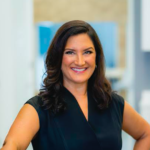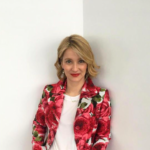Kimmy Scotti has always been entrepreneurial; she started her first company when she was only 15-years-old, and now she is on the other side of the table as a founding partner at 8VC. She lives a self-proclaimed “slash-life,” this means that she spends her time as a bicoastal investor/entrepreneur living in New York/San Francisco. Scotti is also cofounder and executive chairman of the women’s health and wellness company, Monthly Gift. Prior to 8VC, Scotti served as the executive director of business development and operations at Loeb Enterprises where the team incubated and invested in many businesses. While there she cofounded Script Relief, a direct-to-consumer healthcare company that has helped millions of Americans afford their prescription medications. Service is also part of her “slash-life;” she currently serves on the advisory board of Venture for America and is a senior advisor to Cornell Tech at Cornell University.

How did you end up at 8VC? What was your career path?
My career path has been a windy one. When I was just 15-years-old, I built a jewelry line. Back then, I thought that my career would focus on the fashion industry, so I went to the Fashion Institute of Technology. When I graduated, I was really interested in building direct-to-consumer technology. After meeting the best-selling author and career expert Nicole Williams, I decided to wind down my jewelry line and join her to build the content platform for young professional women, WORKS by Nicole Williams. When exploring angles for monetization, we ended up building a digital magazine business that optimized content for the iPad by making it shoppable and providing our members with discounts. It was through that platform that we discovered the healthcare space. A prescription discount coupon product was driving a large portion of our revenues. In the end of 2011, we shifted our focus to healthcare entirely, launching ScriptRelief – a prescription discount product that helps the uninsured and underinsured. It scaled to reach millions of Americans.
After 15 years of building companies from fashion companies to healthcare companies, and after a few years of angel investing, I found the thing I loved most was working with founders. I took an interest in investing and started spending time in San Francisco. So, after spending time with my now partners – Joe Lonsdale, Drew Oetting, Jake Medwell and Alex Kolicich – we found that we had a shared vision for the future and we decided to build 8VC! At the same time, my sister, Lisa Marie and I started Monthly Gift, the feminine care subscription service that delivers tampons, pads and liners in customized packages right to your door for $10 per month. I have been incredibly fortunate to be able to chase both of these passions and I’m loving every minute of it.
What is a workday like? Please walk me through a day!
I live what I call “the slash life” – investor/entrepreneur and New York City/San Francisco – so my days vary a ton. Today is a Monday, so I’ll tell you about that. Mondays today are like what my single-girl Saturday nights once were – my favorite day of the week.
I usually wake up on Monday in San Francisco. I’m an early riser, so I get up with the sun, and “rocket ship” out of bed. Basically, I kick up my feet and give myself a countdown from 10 to one out loud, before I literally jump out. Sometimes I meditate and sometimes I don’t (one of my resolutions is to get that practice back in order). After my morning espresso, which I take with steamed almond milk and a little vanilla, I pack my bag for the day and head to meet the team at the gym. On Mondays, the 8VC team religiously works out together – everyone is scattered around on treadmills and in the weight room, chatting about deals we have going on and their weekends. Then we have breakfast together and head to the office a few blocks away.
We meet as a partnership in the morning and talk about the firm’s operations, upcoming events and each of our priorities. One of the things that we are always doing is ensuring that the way we are spending our time day-to-day matches up to the short-list of priorities we set for ourselves. Then, the rest of our team joins us and we talk through the deals we are currently working on and make decisions on next steps. Usually, we see one or two companies give presentations – it’s often a new company we are interested in potentially investing in and a company from the portfolio that is giving the team an update. If there’s time, I try to scatter in a few other meetings and check in with the companies in our existing portfolio.
Sometimes at the end of the day, I’ll grab a bite with a couple of my partners. Otherwise, I’ll meet my SF bestie for drinks.
Afterward, I get back to emails or catch up on my to-do list while listening to stand-up comedy in the background. Around midnight I wind down and read myself to sleep – my workdays are eyes-open to eyes-shut.
What are your responsibilities as a partner at 8VC?
Unlike some funds, where partners are each given an allocation of the pool to invest on their own, we do everything together. Not only does it make our work environment super collaborative, but it leverages each of our diverse backgrounds and skill sets to make better decisions. Working with my partners has truly made me a stronger investor. I’m more naturally commercial and they have taught me to think more analytically. I think that in return, I help them see things from an operator’s perspective.
Like all of the partners, I am responsible for meeting with new companies, evaluating deals and maintaining close relationships with our portfolio companies. My particular areas of expertise are healthcare and pharmaceuticals and consumer packaged goods, so I tend to be the partner to look at those deals. I also spent a lot of my career as an operator and a marketer, so I’m the go-to person internally for helping all of our portfolio companies with their product-market-fit challenges.
What do you look for when you’re choosing a company to invest in?
It really depends on the stage. With seed-stage companies, sometimes you’re being pitched by a team that has little more than an idea – they haven’t actually done anything yet. In these scenarios, we evaluate the market and measure our perception of the team’s competence to take this idea through to fruition. We don’t just look at whether or not the team is capable, but also whether or not they can think flexibly enough to change direction as they continue to absorb new information.
With later stage companies, there’s actual business traction to evaluate. So in addition to the above, we do a ton of analysis. As far as the team goes, we’re looking at who really understands their operations, market and business, and who basically demonstrate two skills: They know how to create unfair advantages for their business and they draw incredible talent to their team.
What is it like working with seed-stage companies versus later stage ones?
With seed-stage companies, you are still trying to assess whether there’s product market fit, so you’re tinkering a lot with the product and testing marketing. With later stage companies, you’re dealing more with optimization around key performance indicators like margin and customer acquisition cost. The conversations with later stage companies can get more granular because they’ve already figured out their positioning and have more data to work with.
What’s it like being a woman in a male-dominated industry?
To be honest – and this is a potentially unpopular opinion – I feel like it’s a real advantage. Women tend to be far more naturally collaborative, which I think makes me a great partner to the men at the fund, and a great investor for founders to have on their side. Being a woman gives you an “edge” that men in this industry don’t have – insights as a consumer. Women consume more than 80% of everything – and if you have seen my closet, it proves this point. Plus, it makes you memorable, which is exactly what you want to be when a hot company is thinking about where to raise their next round.
What are the most important characteristics someone needs to have to be successful in your role?
Vision for the future, conviction around that vision and a mind that is both analytical and imaginative. You have to be able to visualize something that doesn’t yet exist while simultaneously analyzing the likelihood that people (or companies) will adopt it. Operating experience is not required but ideal – it’s harder to lie to you if you’ve run your own business before. I think my many years building companies has definitely made me a better investor and partner to our portfolio companies.
What’s the biggest lesson you learned at work and how did you learn it?
I learned the hard way not to give anyone else the right to determine what value you’re capable of adding. With the exception of a few rare people, most will try to keep you in the box that makes you the most valuable to them or that makes them feel the most comfortable. Rather than letting your fate be in the hands of other people’s judgment, the only person that should be in charge of your future is you.
You’re also founder and CEO of Monthly Gift. What inspired you to start Monthly Gift?
If you can’t tell, I live a crazy busy life, which means that I have to be super organized. And yet, despite the fact that I used wearables to track my activity, an app to communicate with my doctor and a company that automatically sends me ready-to-blend smoothies…my period was still a surprise to me every month. At the age of 30, I didn’t want to hobble to CVS for an emergency box of tampons at 3 a.m. anymore. When I started talking to my dear friend and mentor, Nanon de Gaspe Beaubien-Mattrick, and my sister, Lisa Marie, about this they both felt the same way.
Plus, we were sick and tired of the way that traditional feminine care companies were marketing to us. When I’m on my period, the last thing I want to be doing is playing beach volleyball in a white bikini. And I know for a fact that I’m not alone there. It was as if the people selling me tampons had never even had a period before! I needed to build a product that not only made my period work better for me, but that was started by real women, for real women with none of the bullshit.
What is one thing that you wish you had known when you were starting out your career?
If I could go back and find myself in the bathroom at graduation, I would tell myself that no one knows what they are doing, so don’t put so much pressure on yourself to have all of the answers right away. In fact, it’s impossible to. The most important thing is to find people with values that are aligned with yours and people who challenge you. I’m super lucky to be surrounded by my partners at 8VC, who are incredibly experienced and who I learn from every day. I couldn’t have crossed the threshold from entrepreneur to investor without the support and guidance of my incredible partners and mentors.
Also – on that note – you just need to pick a step, not a full path. I am constantly talking to people that hate their jobs and my advice to them is always to fix it if it’s broken – you can always go back to this path if you try something new and hate it. Gone are the days that you need to stay in a career for 40 years. Nothing is permanent. Your career is like 70% of your waking hours…you’ve got to enjoy it. If you wake up on Monday, dreading getting out of bed, it’s time to change something.
What is the best advice you’ve ever received?
Nicole Williams taught me that balance is impossible to achieve and that the quest for it puts way too much pressure on a person (especially a woman), thus making them feel worse instead of better. What’s better, is to only focus on what you are doing, when you are doing it instead of trying to do the right amount of each thing. This means everything from not checking your emails during a meeting, to not committing to do so much that it leaves you rushing through each task. Engage deliberately and wholeheartedly. This leaves people feeling fed by the time you spend with them, and you feeling satisfied by the amount of “you” that you’re giving.
What is your career advice for other young professional women?
Don’t sell yourself short by being too afraid to tackle big scary problems. Use the compassion that came with your womanhood to solve problems that are bigger than you.
































Pingback: International Women's Day 2018: Advice From Women Who Inspire Me